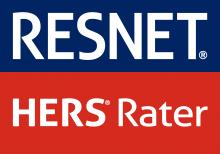Homeowners in Alexandria and Arlington are likely familiar with the benefits of insulation, and how it works to keep a house cool in the summer and warm in the winter.
But fewer homeowners understand how proper air sealing can play just as significant a role in the overall comfort of your home. “What is air sealing a house?” you might ask. Let’s unpack how air sealing differs from insulation, and why air sealing and insulating your Virginia home can help improve your home’s comfort and reduce energy costs.
The Science Behind Air Sealing
Much of the confusion and misunderstanding about insulation is centered around air flow. Most insulation, like fiberglass batt types, is great at reducing heat transfer, but its performance is significantly reduced by unwanted air flow.
Unwanted air flow in a house is created through differences in pressure between indoors and outdoors (warm air has a higher pressure than cold air) as well as small cracks and gaps in the pressure boundaries of your home. The higher the pressure difference, the more air will move between inside and outside of your home.
The Stack Effect
One particularly important piece of air movement in a house is known as the stack effect.
On a cold winter day, the inside air is warmer and therefore less dense than the outside air. The warm air rises and looks for ways to escape out of the top of your home through your attic and roof, and because the escaping warm air must be replaced, cold air is pulled in through the bottom of your home, like the basement and crawl space.
In the summer, the stack effect is reversed, and as the cool indoor air is more dense than the outside air, it is pushed down and out the bottom of your home by warm air infiltrating through the top of your home.
The Benefits of Air Sealing
The more cracks, gaps, and holes in your home, the more you stand to benefit from air sealing. Air sealing cuts down on air flow in your home, which in turn improves the performance of your insulation and prevents outdoor allergens and pollutants from getting inside.
Spray foam insulation is the best way to address air leaks in a home, and from air sealing your attic to insulating and air sealing exterior walls, this kind of home retrofitting can have a number of positive benefits for your home, including:
-
Increased home comfort
-
Lower energy bills
-
Improved indoor air quality
Air Seal Your Home with The Fifth Fuel
According to ENERGY STAR, the average homeowner can save up to 15% on their heating and cooling costs by air sealing their home and upgrading insulation.
If you’re asking “How much does air sealing cost?” or “Is air sealing the attic worth it?”, reach out to The Fifth Fuel today. The best way to identify how much air sealing you need and where it might improve your home is with a home energy audit. From blower door tests to thermal infrared imaging, our energy audits help identify exactly where air leaks in your home are letting in outside temperatures and weakening your home’s energy efficiency.






